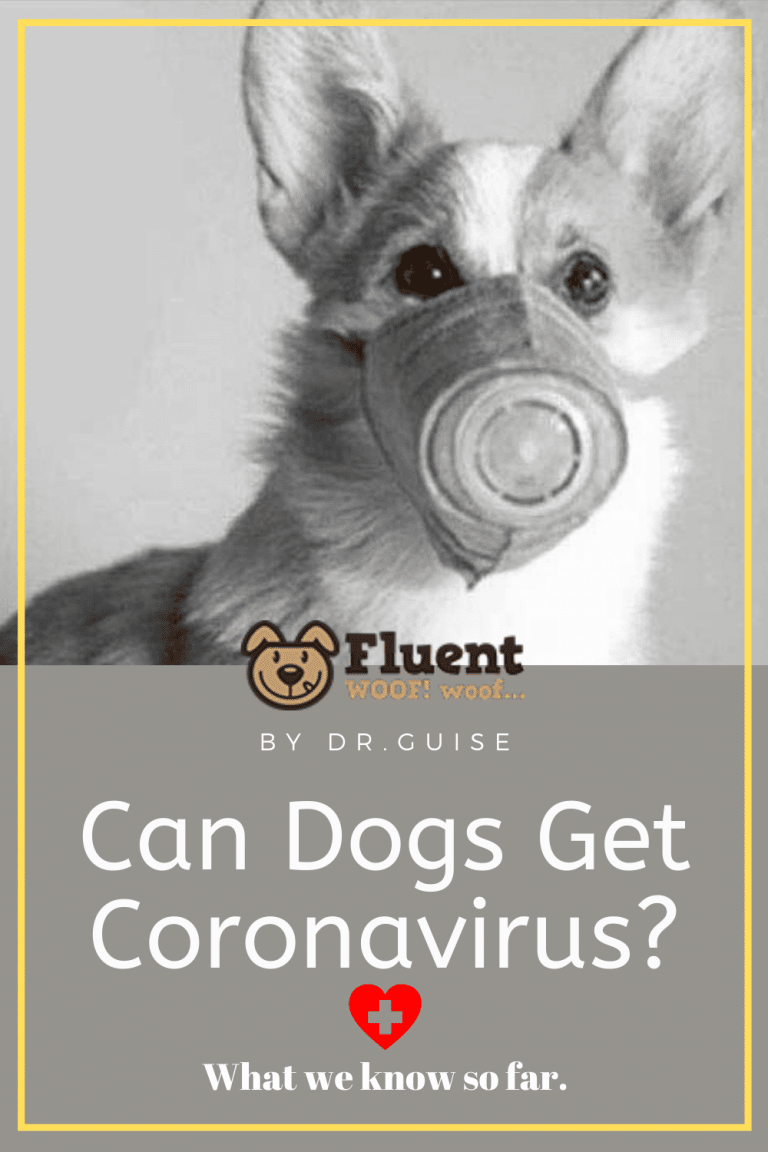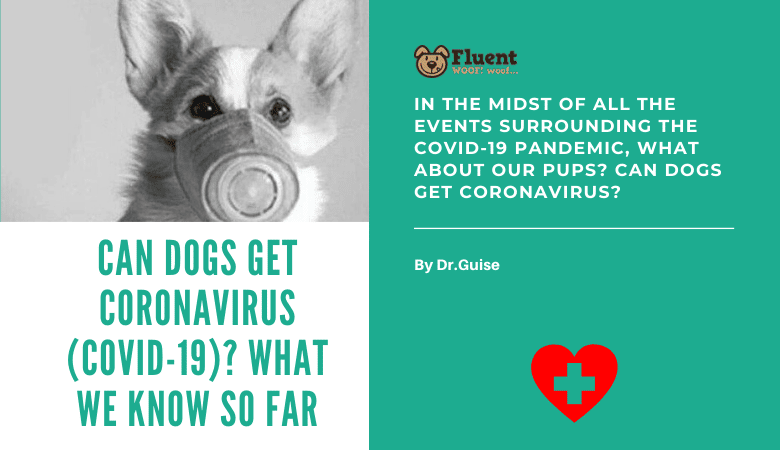In the midst of all the events surrounding the COVID-19 pandemic, what about our pups? Can dogs get Coronavirus?
man the dog already trained to put the mask on 🤦♂️ i’m done. #bransoncognac #lecheminduroi TheKing🍾 pic.twitter.com/HZjgI6BMUE
— 50cent (@50cent) April 8, 2020
Can Dogs Get Coronavirus (COVID-19)?
Omicron
On November 21, 2021, South Africa reported a new variant which was soon dubbed “Omicron” The highly infectious version spread rapidly among the host population and jumped to other countries around the world in a short period of time. With the arrival of a more infectious variant, pet owners and others may have new concerns and questions.
- Are dogs more likely to get sick from Omicron than earlier COVID variants? With each variant, there has been a chance that dogs or other pets could contract the virus. Previous versions tended to cause mild cases of infection in dogs, and according to Dr. Alison Birken, of Victoria Park Animal Hospital in Fort Lauderdale, FL, Omicron is no different
- Can dogs pass Omicron to humans? To date, there have been no documented cases of dogs or cats passing any COVID variant back to humans. However, scientists in China suspect that this new variant arose when the virus jumped to mice and underwent several mutations that made it more infectious before passing back to humans. This kind of spillover is a cause for concern because it may lead to an ongoing cycle of reinfection from newly incubated variants.
- Should I test my dog if I have Omicron? While people can get test-at-home kits, sampling for dogs is only available through a veterinarian. Most veterinarians opt to treat symptoms and test for other diseases first because symptomatic infection with COVID is rare and unlikely to cause death in dogs. If you are infected with Omicron, the best way to protect your furbaby is to isolate from him. I have provided guidelines in a later section about how to protect your dog from infection.
Important Update on new variants (March 2021):
New variants of Covid-19 began to surface in the fall of 2020. One such mutation (B117) appeared in Kent in the United Kingdom in September and may be more infectious than the original strain. The Guardian reports that as the variant spread among the population, a referral veterinary hospital in Buckinghamshire noticed an increase in pets presenting with myocarditis, an inflammation of the heart muscle. The spike of infections mirrored that a B117 variant spike from 6 weeks earlier in the human population.
Doctors at the Ralph Veterinary Referral Center, led by Veterinary Caridologist Luca Ferasin, conducted a case study (awaiting peer-review) on 8 cats and 3 dogs with no previous history of heart disease that were referred to the clinic for myocarditis. Five of these animals, which belonged to patients that were positive for the new variant, had positive screening or antibody test results for the B117 variant. Further study is needed to determine whether this new variant causes heart disease in pets. While these cases show that humans can pass COVID to their pets, there is currently no evidence that infected dogs or cats can transmit it to people.
According to the CDC and USDA, pets seem to be unlikely to get the disease or pass it on. But that’s not 100% certain…
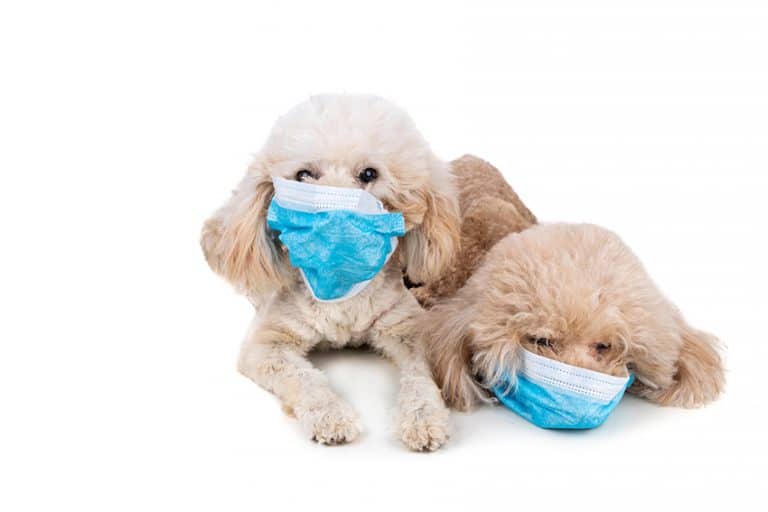
- In early March, 2021 the CDC tweeted a notice that there had already been over 100 cats and dogs that tested positive for COVID. They urged owners who contract the virus to protect their pets by avoiding contact while they’re sick.
- With more commercial labs now running tests on pets, Dr. Jim Dobies, president of Urgent Vet Clinic in Gaston County shares, “The CDC is very clear that we should, as practitioners, suspect COVID-19 in a dog or a cat that comes from a household where humans have been infected." Fortunately, it appears that for most pups that get the virus, it’s a mild disease with low risk of severe complications.
- On July 9, the NVSL confirmed a shepherd mix from South Carolina tested positive for COVID-19 after the owners contracted the virus. Veterinarians euthanized the pooch because it also suffered from a chronic health condition.
- Health officials in Georgia announced on July 1 that another dog tested positive for the virus. After the owners had positive test results, the pets underwent testing as a precaution. The six-year-old mixed breed had no respiratory signs but was euthanized after developing neurologic symptoms. Necropsy results indicated the animal had a brain tumor. There was a second pup in the household that tested negative.
- On June 2, the NVSL announced the first confirmed positive dog in the United States. After the owner contracted the Coronavirus, a German Shepherd named Buddy in the household developed signs of a respiratory infection. The dog had a thick mucus discharge and wheezing starting in mid-April. The USDA collected samples and confirmed presence of the virus. on May 15. A follow-up test on May 20 was negative. A second pooch in the household also had antibodies to COVID-19 but is asymptomatic. Buddy’s health declined over the next few months, and he passed away on July 11. He was also diagnosed with lymphoma on the day of his death. Unfortunately, Buddy’s remains were cremated before the health department decided to do a necropsy. His case raises questions as to whether underlying conditions may increase the risk of a dog for contracting this virus. Glenn Browning, a veterinary microbiologist at the University of Melbourne, Australia stresses that while Buddy had coronavirus for a part of his illness, it’s not likely the cause of his death. He was not COVID positive at the end of his life. The infected pup is expected to recover fully.
- On May 14, scientists released results of genetic sequencing of the virus isolates from the Pomeranian and German Shepherd. The samples matched those found in their infected owners providing evidence that dogs can get the virus from their humans. There was no indication that pooches can infect other canines or their masters. However, further study is warranted. In addition, the researchers confirmed that these two pooches had an antibody response. This finding tells us the animals were infected with the virus and not just carriers. There was no indication that pooches can infect other canines or their masters. However, further study is warranted.
- On April 28, 2020, reports surfaced that a Pug in Chapel Hill, NC tested positive for Coronavirus. This pooch lives in a household with another dog and cat that had negative test results. It’s the first canine to show mild symptoms of the disease. In his human family, 3 out of 4 members also were positive for the virus. According to Annie Harvilicz, a veterinarian and chief medical officer for Animal Wellness Centers hospitals,“It’s possible that being a pug made him more susceptible to the virus.” This breed has a short nose and a tendency towards contracting upper respiratory tract infections. NOTE: further testing by the National Veterinary Services Laboratories (NVSL), a branch of the USDA, could not verify an infection in this pup. Lyndsay Cole, an agency representative, suggests the original weak positive result, “ may be the result of contamination from the COVID-19 positive household."
- There have been two pooches in Hong Kong that showed positive results: The first pup had a very weakly positive result for COVID-19. After the owner contracted the disease, officials tested the Pomeranian, which was asymptomatic. Low levels of virus were detected on swabs from the animal’s nasal passages and mouth. However, follow-up serology was negative for blood antibody levels. It is possible that the dog picked up the organisms by breathing the owner’s infected respiratory droplets.
- More recently, a German Shepherd in the Pok Fu Lam area of Hong Kong tested positive. This pooch and another mixed-breed from the same household were placed under quarantine after their owner contracted the novel coronavirus. Results from the canines came back on March 19. The mutt was negative, and neither animal was showing any symptoms of illness.
- There are conflicting reports that either a third dog or a cat have tested positive for COVID-19 in Hong Kong as of March 30, 2020. Both sources report the pet was screened because its owner has the virus, but the animal is asymptomatic.
What Does This Mean? Can We Pass Coronavirus to Our Dogs?
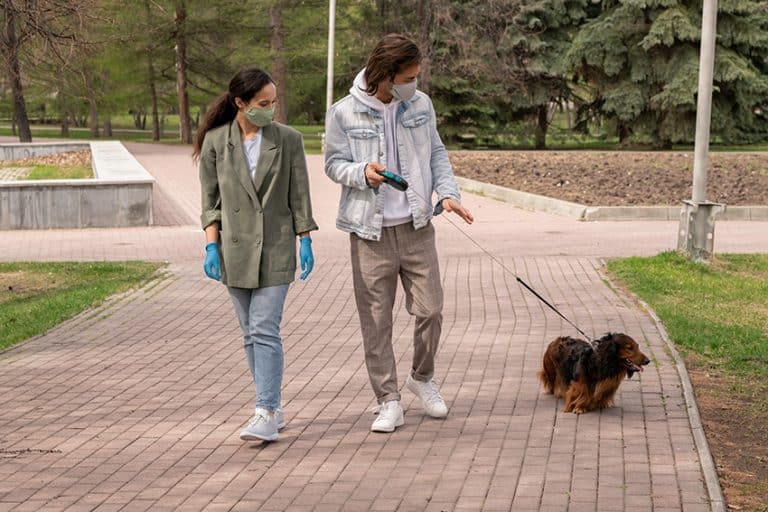
While it’s pretty unlikely that we can pass the virus to our pups, that one positive result leaves some doubt. So what do we need to know about the virus?
According to The World Organization for Animal Health (OIE), “There is no evidence that dogs play a role in the spread of this human disease or that they become sick.” While the dog may have picked up the virus from its infected owner, pet owners that contract COVID-19 shouldn’t abandon their furbabies or panic unnecessarily.
As for the tests, Dr. John Howe, president of the American Veterinary Medical Association, explains that the tests used on the dogs in Hong Kong were strong enough to detect the presence of a part of a virus on the animals and do not necessarily indicate the pups had an infection.
What About Cats...Can They Get COVID-19?
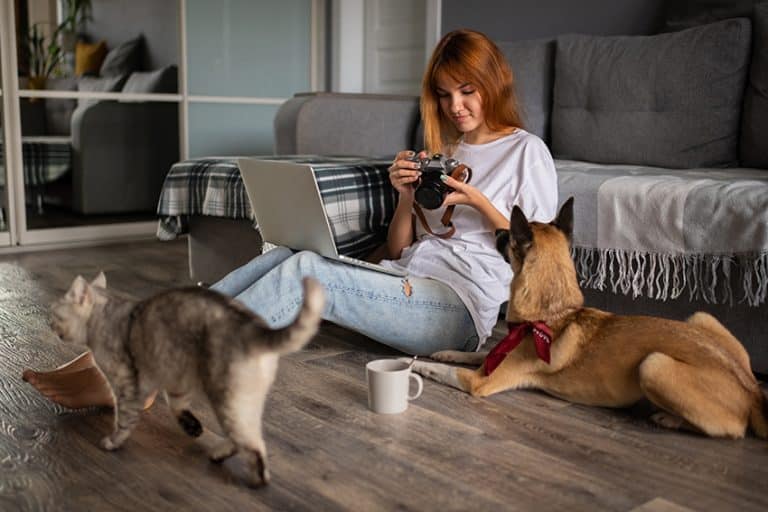
In addition to dogs, it appears cats may be able to pick up the virus. A cat in Liège, Belgium showed symptoms of diarrhea, vomiting, and difficulty breathing a week after the owner contracted the virus. The cat tested positive for COVID-19. Veterinary officials continue to believe that the disease can not be spread from pets to their humans. However, there are questions as to whether we should be testing furbabies if their owners become infected.
On April 22, the U.S. Department of Agriculture and the Centers for Disease Control and Prevention announced that 2 cats in New York state tested positive for COVID-19. One cat lives with a COVID-19 positive owner, and the other cat had been allowed to go outdoors. Both showed signs of mild respiratory illness suggestive of the virus. They are both expected to recover.
On April 5, 2020, a Tiger in the Bronx, NY zoo also tested positive after she and six other large cats developed coughs and other symptoms of COVID-19. All of the felines are expected to recover. On April 22, the zoo released news that follow-up testing revealed a total of 5 tigers and 3 lions were positive for the virus. They believe the animals contracted the disease from an infected zookeeper.
What Does Coronavirus Infection Look Like in a Dog?
COVID-19 is a novel form of a class of viruses called Coronaviruses. Even though this new micro-organism doesn’t appear to affect dogs, a few of the other varieties of this microbe can.
Canine Coronavirus
Enteric Canine Coronavirus (CCoV) is an infectious disease that affects the digestive system in dogs. Pups pick up the infection when they eat infected feces or come in direct contact with sick animals. Signs of illness can be mild but may include:
- Abdominal pain
- Sudden onset of diarrhea/loose stools that have a fetid odor
- Lethargy
- Decreased appetite
Symptoms show up 1-4 days after ingesting the virus and they usually last 2-10 days unless there’s a secondary infection.
Canine Respiratory Coronavirus
Canine Respiratory Coronavirus (CRCoV) is similar to kennel cough in pooches or the common cold that people can get. This form of coronavirus is very contagious for dogs. It’s transmitted by direct contact with sick animals, aerosol droplets, and contact with contaminated surfaces. Infections can range from subclinical carriers to severe disease. Symptoms may include:
- Cough
- Sneezing
- Nasal discharge
- Pneumonia – usually due to co-infection with other pathogens
Incubation for CRCoV is thought to be a few days, and signs can last 1-2 weeks.
What Can I Do to Protect My Dog From Coronavirus Right Now?
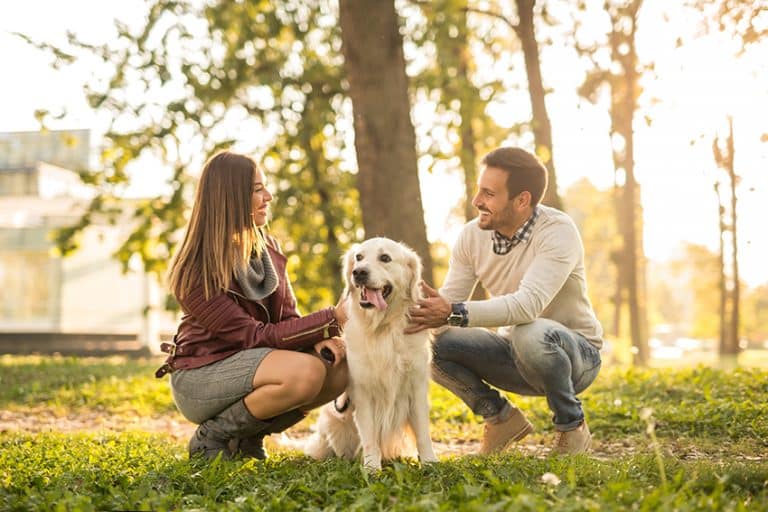
- Avoid taking your pooch to gatherings with large crowds
- Keep your furbaby away from any infected individuals
- Practice good hygiene at home (more below)
- Have a pet preparedness plan in place (more below)
CDC Guidelines for Pet Owners
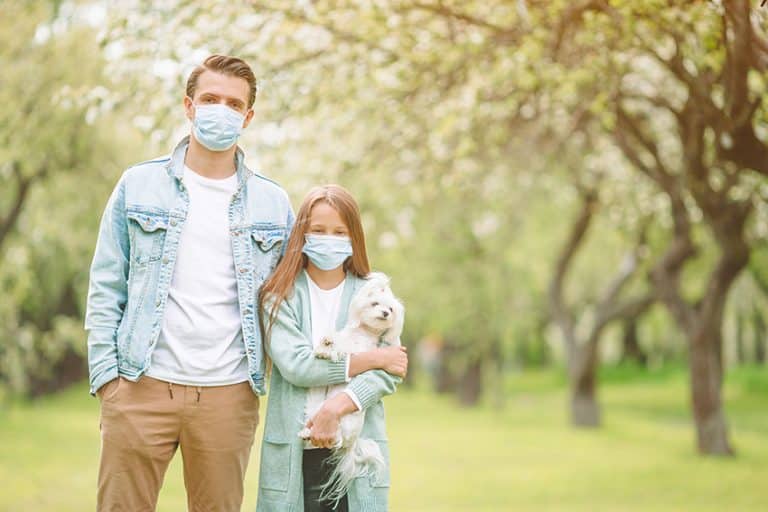
- Keeping cats indoors
- Including your pooch in your family’s 6 foot social distancing bubble
- Walking your furbaby on a leash
- Avoiding dog parks and other places where groups of people gather
- Avoid snuggling, sharing bedding, petting, sharing food, and being licked by your pal
- Arrange for another family member to care for your pup if you become ill
- If you have no one else to help with your pets when you’re sick, wear a face covering and wash your hands before and after interacting with them.
The FDA Recommends Social Distancing for Pets
- Keeping cats indoors
- Walking your dog on a leash and including him in your 6 foot social distance bubble from other dogs and people
- Avoiding dog parks
Should There Be a COVID-19 Vaccine for Dogs?
The USDA is not granting licensing approval for any COVID-19 vaccines for pets at the present time because there’s not a significant public health risk:
- According to William Karesh, executive vice president for health and policy at EcoHealth Alliance,“Cats and dogs don’t play an important role in the maintenance or transmission of the disease to humans.”
- In addition, most pets that get COVID experience mild to no symptoms.
Fortunately, if there are future mutations or indications that a vaccine for dogs is warranted, it probably won’t take long to develop and distribute one. Both Russia and the U.S. pharmaceutical company Zoetis are currently on vaccines for mink and domestic animals.
Can Our Dogs Pass Coronavirus to Us?
Can Dogs Carry the Virus on Their Fur?
Is It Safe to Pet My Dog/How Can I Pet My Dog During the Coronavirus Pandemic?
No Need to Panic
Should I Change My Behavior With My Dog Because of COVID-19?

- Wash Fido’s bedding regularly
- Wash your hands after feeding, playing with, or cleaning up after your pooch
- Store dry foods in an airtight container and refrigerate wet foods
- Wash food and water bowls regularly
- Wash toys and replace them when they become damaged
- Keep outdoor areas clean by picking up feces frequently
How Will Social Distancing Affect My Dog’s Behavior?
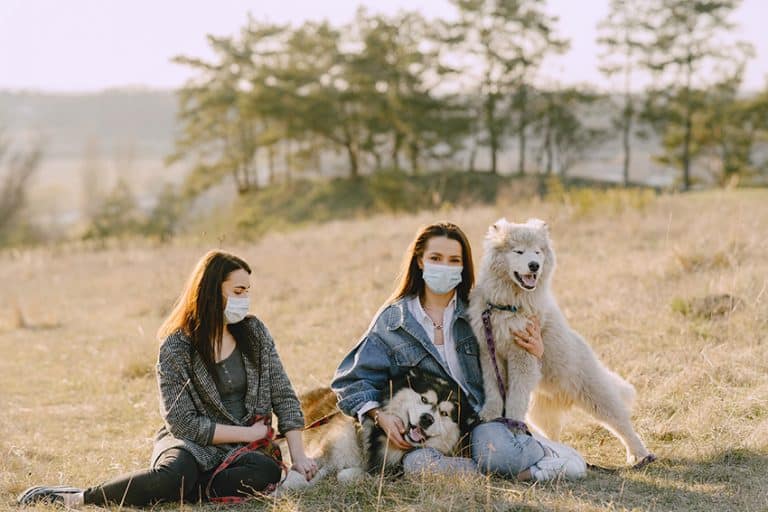
Some owners are reporting behavioral changes in their pups during the shelter-in-place orders. If you usually leave the house during the day to go to work, your constant presence may impact your pooch. The adjustments will depend on your pooch’s personality. Possible actions include:
- Hyperactivity or agitation
- Fearfulness
- Becoming clingy
If Fido is having trouble adjusting to the “new normal” try to give him some space and alone time unelss he wants to stay by your side.
What Should I Do Differently With My Dog If I Have Coronavirus?
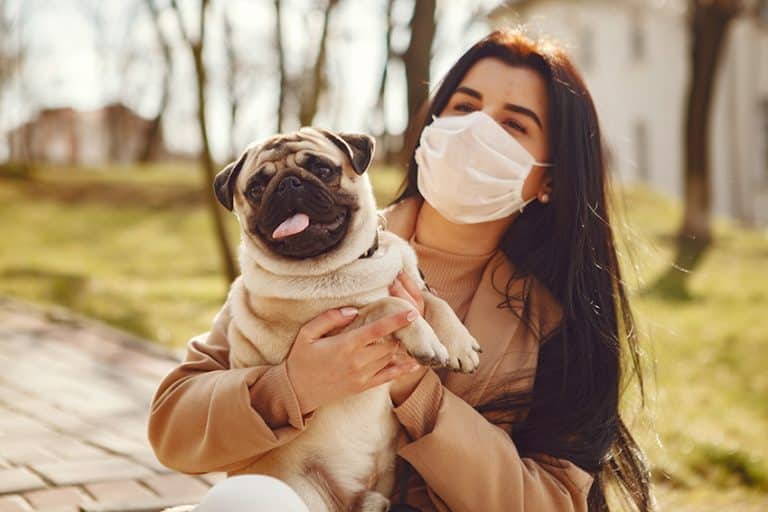
Because we can’t be 100% certain that you can’t pass the virus to your furry friend, it’s best to err on the side of caution. For one, the CDC recommends that you avoid contact with your dog as you would with other family members.
- If possible, plan for someone else to care for your special pal while you’re recovering.
- If you have no one to take your furbaby, wash hands before and after contact with Fido, and wear a facemask to keep your droplets to yourself.
- Avoid direct contact with pets – sadly that means no petting, snuggles, kisses, or sharing of food.
- Have a pet preparedness plan in place (see below).
Is It Okay to Take My Dog for Walks?
Is It Okay to Let My Dog Socialize With Other Dogs?
Should I Put a Mask or Booties on My Dog?
You’ve probably seen pictures of dogs wearing pet masks or booties, but it’s not necessary. From what we can observe, the virus passes between people by their respiratory droplets. There are better things to spend your money on than a facial covering for Fido that will probably make him nervous and uncomfortable.
Do I Need to Have My Dog Tested?
The CDC does not recommend testing of pets. However, due to public demand, IDEXX Laboratories, Inc. in Maine announced on April 20 that it would make a pet test for COVID-19 available to veterinarians. The roll out will start in North America and eventually spread to the world. Based on guidelines, animals eligible for testing must meet the following criteria:
- The attending veterinarian has consulted with a public health official
- The pet lives be in a home with a COVID-19 infected or positive patient
- The animal has already tested negative for common rule-out diseases
- The pet must have clinical signs of COVID-19
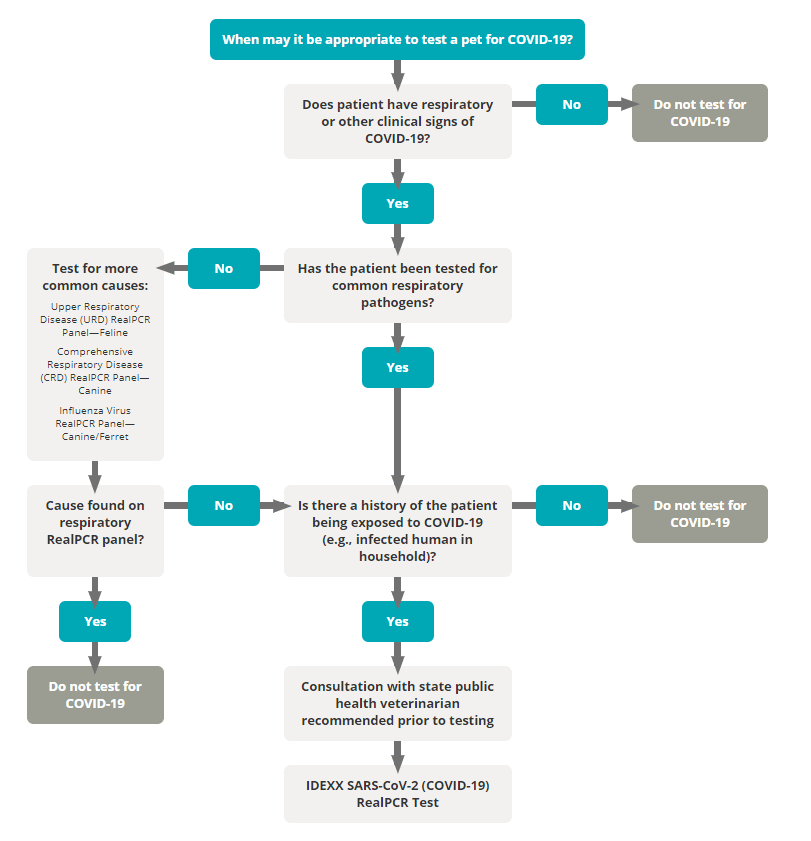
What If My Dog Gets Sick While I’m in Quarantine?
If you’re not infected but following stay-at-home orders and Fido gets sick, call your veterinarian (some clinics are turning to virtual healthcare to make it easier for dog parents). If your pal’s doctor advises you to bring him in, follow their procedures. In our town, clinics are still open but taking extra precautions. Office workers are meeting people at cars and taking Fido into the buildings while owner waits in parking lot.
Will I Need to Quarantine My Dog?
- Keep them at home in a separate room from other animals and people
- Wash hands before and after handling or feeding them
- Consider wearing a facemask when you enter their room.
Pet Preparedness Plan in Case of Emergency
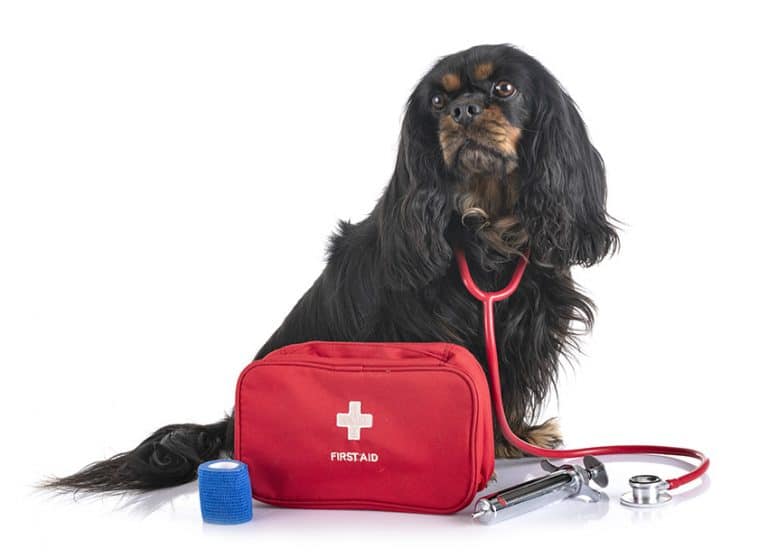
- Have a first-aid kit for dogs stocked and ready for emergencies and review basic first aid for pets regularly
- Have an adequate supply of food, medicines, and other products that you need to care for your pooch.
- Line up a trusted friend or family member who can look after your furbaby if you’re incapacitated.
- Have food, other supplies, and crates on hand in case you need to move your pup quickly.
- Keep your special pal up-to-date on all vaccinations required by your boarding facility.
- Prepare a document detailing all medications, dosing instructions, and prescription information.
- Make sure your pet has current identification including an ID tag for the collar and a microchip.
In the News: Dogs and Coronavirus Across the Globe
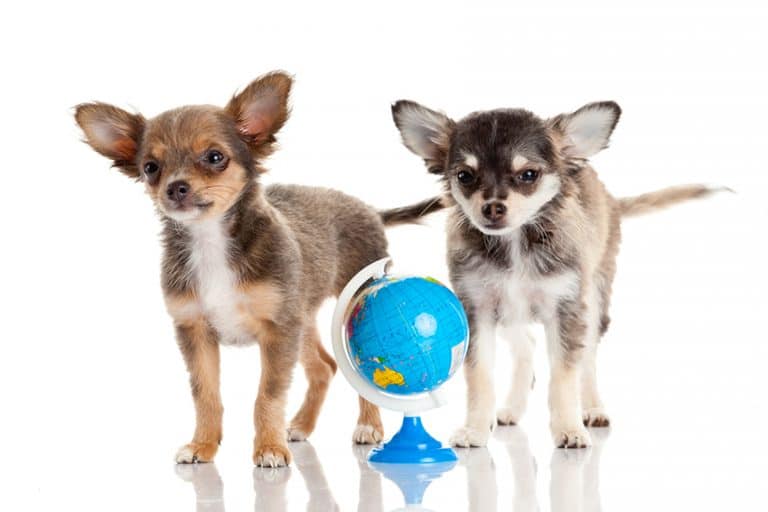
Pups May Join Frontlines in Battle Against Coronavirus
In addition to the work in London, other researchers are training dogs across the globe to detect coronavirus. Teams at the University of Pennsylvania are working with Labrador Retrievers, and police in Chile are training bio-detector sniffer dogs to help locate infected people in large crowds.
In November, 2020, Nature reported that an International K9 Team met online to discuss preliminary findings. This team consists of groups of people working with dogs that have been trained to sniff out COVID-19. Using sniffer canines, the groups have run trials in airports at nations including Finland, Lebanon, and the United Arab Emirates. They used sweat samples from passengers and compared the results to those from conventional screening tests. The initial data showed that the pups were able to detect a Coronavirus infection earlier than the regular screening. These results still need to be compiled for a peer reviewed study, but the preliminary findings are promising.
DogTrust Charity Issues a Warning
Puppies Sold to Testing Labs
In France, officials enacted a decree that allows dog breeders to sell excess stock to testing laboratories. The animal rights organization, France’s One Voice is circulating a petition to renounce the action. It also filed a complaint with the French high court in hopes of reversing the order.
Report from Market Data Analytics
Cairo Clinic Launches Internet Campaign Against Abandoning Pets
New Zealand Includes Canines in Social Distancing
Fallout in China
Canine Quarantine in Italy?
Canine Coronavirus in Australia
- Any new animals entering the country
- Any greyhounds showing signs of disease
- Any greyhounds that contact infected animals
Stay Tuned...
The information above is based on what we currently understand about COVID-19 and our dogs. We’ll update the article if new details regarding the virus come to light.
